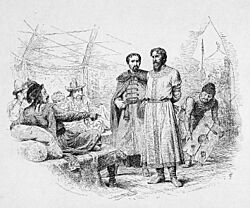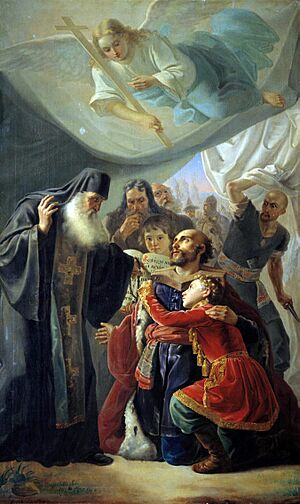Mikhail of Tver facts for kids
Quick facts for kids Mikhail Yaroslavich of Tver |
|
|---|---|
| Grand Prince of Vladimir Prince of Tver |
|

Mikhail Yaroslavich before the Mongol khan, by Vasili Vereshchagin
|
|
| Born | 1271 |
| Died | 22 November 1318 (aged 46–47) Sarai |
| Spouse | Anna of Kashin |
| Issue | Prince Dmitry of Tver Prince Alexander of Tver Prince Konstantin of Tver Prince Vasily of Kashin Feodora of Tver |
| House | Yurievichi |
| Father | Yaroslav III |
| Mother | Xenia of Tarusa |
Mikhail Yaroslavich (also known as Michael or Mikhail of Tver) was an important ruler in medieval Russia. He was born in 1271 and passed away on November 22, 1318. Mikhail became the Prince of Tver in 1285. Later, he also ruled as the Grand Prince of Vladimir from 1304 to 1314, and again from 1315 to 1318. The Russian Orthodox Church later recognized him as a saint.
Mikhail was the second son of Yaroslav III. His father was the younger brother of the famous Aleksandr Nevsky. Mikhail took over as Prince of Tver after his older brother Yaroslav. His mother, Xenia, is also known as Xenia of Tarusa, a saint. When Andrei Aleksandrovich (Aleksandr Nevsky's son) died in 1304, Mikhail became the Grand Prince of Vladimir. This was decided by an old system where the next oldest relative in the family line would rule. The powerful Golden Horde (a Mongol empire) confirmed his position.
Contents
Challenges as Grand Prince and Rivalry with Moscow
Even though Mikhail was the rightful ruler and had the support of the Mongol Khan, he faced many problems. These issues eventually led to him losing his important position. He was also accepted as the Prince of Novgorod in 1309. However, he had disagreements with Novgorod. He even stopped sending his officials and grain to the city in 1312.
Mikhail got along well with Tokhta Khan, and at first, with the next Khan, Uzbeg Khan. Mikhail visited Uzbeg Khan in 1313 and stayed until 1315. But while Mikhail was away, Yury of Moscow became more powerful in Novgorod. Mikhail finally took control of Novgorod in 1316 with help from the Mongols. However, the next year, Uzbeg Khan gave the title of Grand Prince of Vladimir to Yury. Yury also married the Khan's sister, which made him even more powerful.
After giving Yury the title, the Khan sent his army to help Yury fight Mikhail. On December 22, 1317, Mikhail defeated Yury in a battle near Tver. Mikhail captured Yury's wife, who was the Khan's sister. She later passed away while she was with Mikhail. Mikhail was blamed for her death, even though it was unlikely he would have harmed her. He knew it would cause him serious political trouble. Mikhail released the Mongol general, Kavgadii. Kavgadii returned to the Horde and accused Mikhail of many things. He claimed Mikhail killed the Khan's sister, didn't pay tribute, and fought against his Mongol rulers. Because of these accusations, Mikhail was called to the Horde by the Khan. He was executed on November 22, 1318.
Mikhail and the Church
Mikhail also had disagreements with the Church, especially with Metropolitan Petr. When the head of the Church, Metropolitan Maksim, died in 1305, Mikhail suggested a different person for the role. But Petr was chosen by the Patriarch of Constantinople. Petr often sided with Moscow and opposed Mikhail. For example, in 1309, Petr appointed David as the Archbishop of Novgorod. David played a big part in the argument that made Mikhail stop sending supplies to Novgorod. In 1314, Novgorod even asked Yury to become grand prince and remove Mikhail. So, the Church's support helped Yury and hurt Mikhail.
Even though the Church didn't support Mikhail during his life, they later declared him a saint. This was because he showed great faith and courage when he was called to the Khan, knowing he would likely die. Also, when his body was brought back to his hometown, it was found to be well-preserved, which was seen as a miracle.
Family and Children
In 1294, Mikhail married Princess Anna of Rostov. She was the daughter of Dimitry of Rostov. They had five children together:
- Prince Dmitry of Tver (1299–1326)
- Prince Alexander of Tver (1301–1339)
- Prince Konstantin of Tver (1306–1346)
- Prince Vasily of Kashin (died after 1368)
- Feodora of Tver
Mikhail's sons, Dmitry and Alexander, were also important figures. Both Alexander and his son Mikhail briefly held the Grand Princely office. However, Mikhail's failure against Yury of Moscow, and Alexander's role in the Tver Uprising of 1327, caused the Tver family branch to lose favor with the Khans. After 1317, the princes from Moscow mostly held the title of Grand Prince.
Mikhail's wife, Anna, became a nun in Kashin. She passed away there on October 2, 1368. The Russian Orthodox Church remembers her as Anna of Kashin and made her a saint in 1677.
| Yurievichi connection of Moscow, Novgorod-Suzdal, and Tver | |||||||||||||||||||||||||||||||||||||||||||||||||||||||||||||||||||||||||||||||||||||||||||||||||||||||||||||||||||||||||||||||||||||||||||||||||
|---|---|---|---|---|---|---|---|---|---|---|---|---|---|---|---|---|---|---|---|---|---|---|---|---|---|---|---|---|---|---|---|---|---|---|---|---|---|---|---|---|---|---|---|---|---|---|---|---|---|---|---|---|---|---|---|---|---|---|---|---|---|---|---|---|---|---|---|---|---|---|---|---|---|---|---|---|---|---|---|---|---|---|---|---|---|---|---|---|---|---|---|---|---|---|---|---|---|---|---|---|---|---|---|---|---|---|---|---|---|---|---|---|---|---|---|---|---|---|---|---|---|---|---|---|---|---|---|---|---|---|---|---|---|---|---|---|---|---|---|---|---|---|---|---|---|
|
|||||||||||||||||||||||||||||||||||||||||||||||||||||||||||||||||||||||||||||||||||||||||||||||||||||||||||||||||||||||||||||||||||||||||||||||||
See also
 | Kyle Baker |
 | Joseph Yoakum |
 | Laura Wheeler Waring |
 | Henry Ossawa Tanner |


